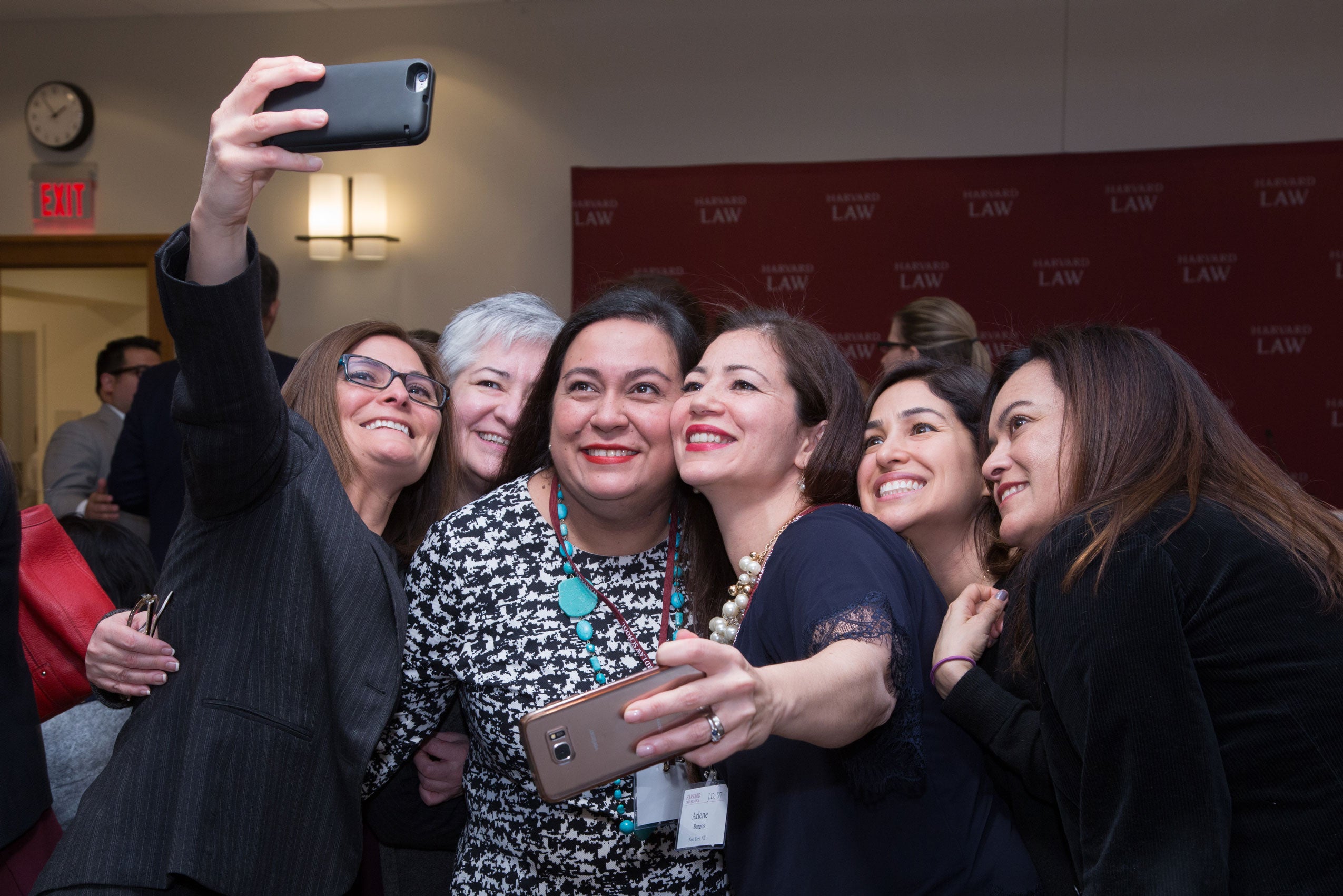The third Celebration of Latino Alumni brought more than 200 HLS alumni and guests back to campus in March to reconnect, talk and contemplate the theme “Latino Leadership: Embracing the Challenge.” The Bulletin interviewed five alumni about their paths to prominence in government, the courts, and business, as well as what they’ve learned and what they’re working on now.
Christine M. Arguello ’80
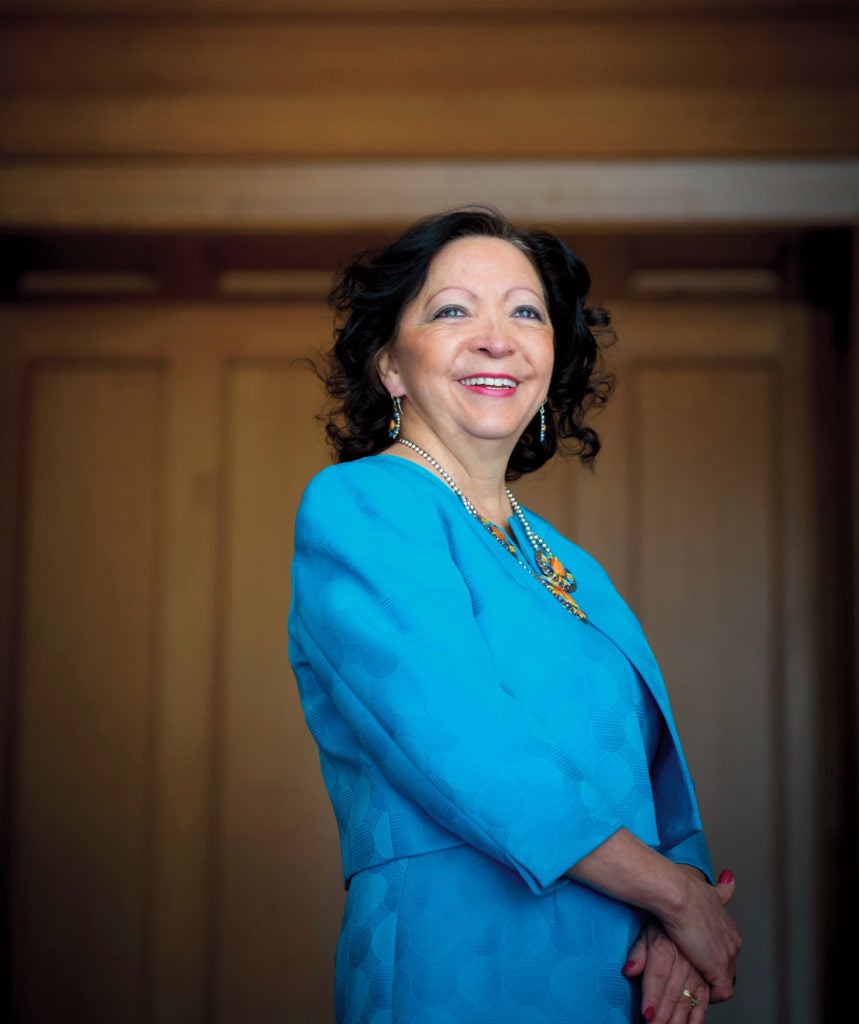
After decades as a litigator and then a law professor, Christine Arguello ’80 was named a federal judge in the District of Colorado in 2008. In 2014, she co-founded LAW SCHOOL. . . Yes We Can (Sí Se Puede), a law school pipeline mentoring program for Colorado high school graduates.
On the role of mentors in her own education:
In high school, when my classmates scoffed and laughed at my plans to attend Harvard Law School and almost destroyed my ambition for it, my English teacher stopped me in the hallway and said, “Chris, I know you can do it.” Those seven words turned me around. I said, “I will do it.”
On coming to Harvard from Colorado in 1977:
“I describe (HLS) as the three best years of my life and the three worst years.”
—Christine Arguello
It was a real culture shock. I’m a very small-town girl. I’d never really traveled outside Colorado, except to northern New Mexico to visit my grandparents. My husband and I couldn’t understand the Boston accent. There was no Hispanic food to be found anywhere. We had to have care packages sent from Colorado with powdered red chili and frozen green chili. I describe it as the three best years of my life and the three worst years of my life.
HLS, the best years:
I was thrilled to meet so many people from so many different aspects of life, all of whom were very accepting of me. I did not feel that they looked down on me because of where I came from or because my parents didn’t even have a high school education. That’s why I go back to virtually every reunion—for Hispanic alumni, for my class reunions.
HLS, the worst years:
The first year was very demoralizing. I started to question whether I had the smarts to be in Harvard. It was like I was trying to learn this foreign language that I could not crack the code of. It taught me the most important lesson of my life: It’s OK not always to be the best, as long as you gave it your best. I learned at Harvard that it was no longer about the grade. It was about the education, the knowledge, the experience.
At the Celebration of Latino Alumni, she spoke on a “pathways to the bench” panel:
The most valuable asset you possess is your reputation. You cannot sell your soul for your clients or money. You have to do what is right and treat people right. Because when the FBI goes out to do their background checks, if you don’t live your life right, if you’re not that professional, you’re not going to get an appointment—especially to the federal bench—because there’s so much scrutiny.
On obstacles to success as a Latina:
This still happens to young Latinas today: There’s not an emphasis on women in the Hispanic culture to go on to higher education. My dad even told me this—how going to Harvard was going to ruin my marriage, how men do not like wives being better-educated or making more money than them. My husband got that from his friends, too. He had enough self-esteem that his response to them was, “It’s not her money or my money—it’s our money.”
Advice for overcoming career obstacles:
You can’t wait for a mentor to find you. You have to find them. You have to be assertive enough to take your career in your own hands.
Her goals for the law school mentoring program she co-founded:
We try to give [the students] the same advice we wish we’d had. We talk to them about what is needed for a law school application, so that from freshman year in college, they’re thinking of what they need to do. If they go on to become lawyers, hopefully they’re going to come back to Colorado.
David Lopez ’88
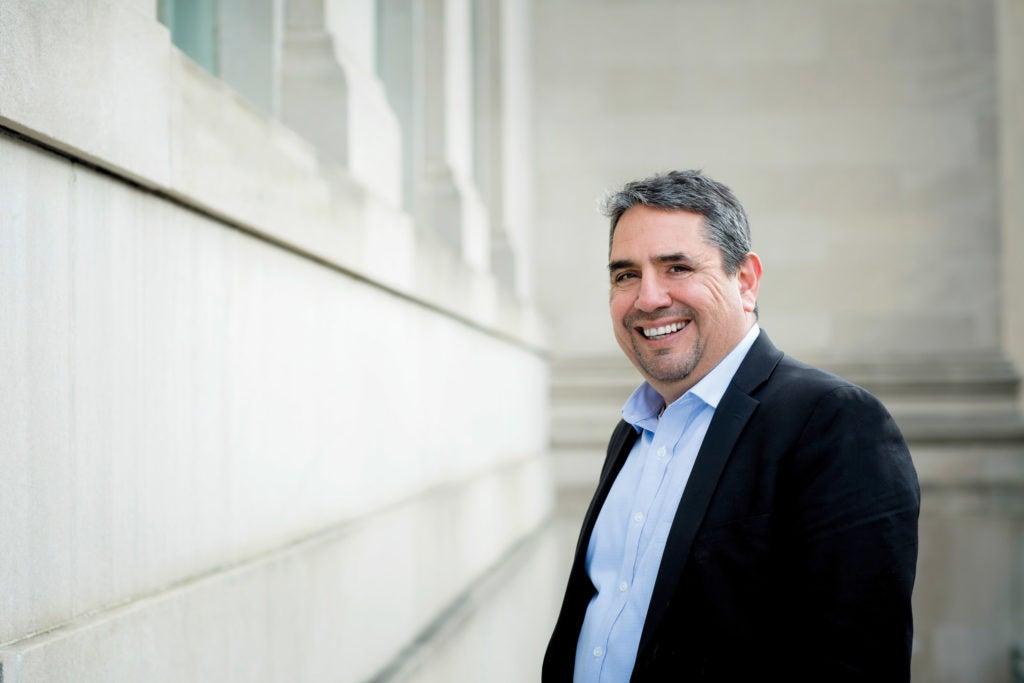
After 12 years as a trial lawyer for the Equal Employment Opportunity Commission in his native Arizona, David Lopez ’88 spent six years as the EEOC’s general counsel. He left the federal government in December 2016 to become a partner with the law firm Outten & Golden and run its new Washington, D.C., office, where he focuses on anti-discrimination litigation.
His parents were involved in Cesar Chavez’s farmworkers movement:
My most prominent childhood memory was handing out flyers for the United Farm Workers, to boycott grapes at Safeway. I hated every single minute of it. There would sometimes be hostility, marching and screaming. I was a quiet kid. I wanted to be left alone with my baseball cards and my books. I would always ask my parents, “Why can’t we be normal, like the Brady Bunch?” They would always say, “Mi hijito”—my son—“you have an obligation to leave the world a better place.”
How Martha Minow influenced him:
As a civil procedure professor, Dean Minow taught very broad concepts that helped me understand the law. She assigned an article called “Can Lawyers Love?” The premise was that litigators have a hard time in interpersonal relations, because the skills you need as a litigator are pretty much antithetical to the skills you need to be successful in a relationship. I always remember that, because I’ve been married for 26 years. So I’ve told her, “I may not have done great in your class, but I’ve been married for a long time.”
On HLS and merit:
Practicing in federal court in Arizona, I don’t think the name Harvard Law School ever left my lips. It was very much a meritocracy. You lived and died on how well you advocated in federal court. The Harvard Law School network that I think was so helpful in Washington was actually nonexistent during my 12 years in Arizona.
His connection to Boston and Harvard:
Every year, we spent summers in Boston, because my wife is from Jamaica Plain. I’d always go to Harvard Law School. I’d take the kids. I’d show them Story Hall, and tell them how I lived there, and was peer-pressured into going to a party where I met their mother.
Case he tried in Arizona for the EEOC that he’s proudest of:
The Alamo rental car case was the first backlash discrimination case filed by the EEOC. It involved a teenage Somali refugee, working as a customer service representative, who was fired for insisting on wearing a hijab in observation of Ramadan. We tried it to a jury and won a significant damage award, including significant punitive damages, because we were able to tap into some quintessentially American values of religious freedom and inclusiveness. The defense may have been banking on some anti-Muslim backlash, but what happened was a recognition that these are values as old as the Mayflower in this country.
While he was general counsel, the EEOC won a similar case against Abercrombie & Fitch, on behalf of a young woman rejected for a job because she wore a headscarf:
I think that was a major case, because there were amicus briefs filed from across the spectrum. Every denomination—Orthodox Jewish groups, Christian groups—all weighed in and came together.
At the CLA, he hosted a panel on Latino civil rights:
With the Trump administration, there’s a lot of concern in civil rights and human rights communities about turning back the clock. There does appear to be a lot of scapegoating going on. I think people are very concerned about issues of discrimination, about the exacerbation of social division. But even more fundamentally, there’s a concern about the degradation of our democratic institutions: checks and balances, freedom of press, and the independent judiciary. There’s a lot of concern that they’re under attack and that it’s important to push back.
Joaquin Castro ’00
and Julián Castro ’00
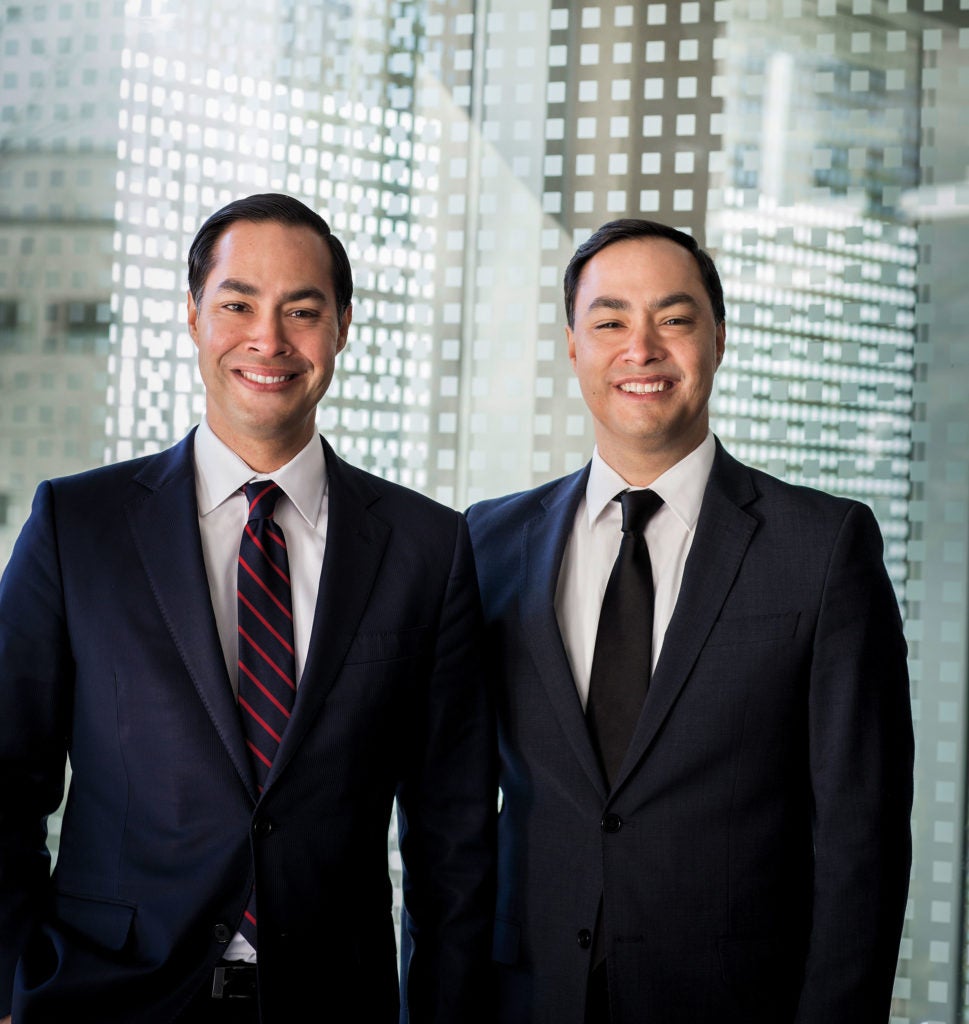
U.S. Rep. Joaquin Castro ’00 was elected to Congress in 2012 after 10 years in the Texas Legislature. His identical twin brother, Julián Castro ’00, served as mayor of San Antonio from 2009 to 2014 and as U.S. secretary of Housing and Urban Development from July 2014 to January 2017.
Julián Castro started running for San Antonio City Council in his third year at HLS:
I had a map of the district up in my dorm room in Shaw Hall. We started by inviting classmates to attend a little fundraiser, where people chipped in $25 each, at a classmate’s rented house somewhere on Mass. Ave. I think it was in late March 2000.
The brothers on memorable HLS professors
Joaquin Castro:
Anne-Marie Slaughter [’85] had a great way with the students. Especially the first year, there was a lot of anxiety with the Socratic method. She eased the tension. She seemed to understand people were going through a tough time.
Julián Castro:
The people I was most taken by were [Morton] Horwitz [’67], who taught torts, and [Martha] Minow, who taught civil procedure, [because of] their respect for the intellectual capacity of the students. They were also giving of themselves, answering questions and making themselves available.
Professor Laurence Tribe ’66 helped Joaquin Castro challenge President Trump’s enforcement of his January travel ban:
I prepared a resolution that said there should be an investigation by the Department of Justice into whether the president ordered Customs and Border Protection to willfully ignore the [federal district] court order [that] put a freeze on the president’s executive order. Customs and Border Protection put out a statement that basically said, “We’re going to keep doing what President Trump asked us to do.” There was anecdotal evidence at the airports that they were still detaining people and wouldn’t let people see their lawyers.
“We have to make sure we don’t give up on any group of people.”
—Julián Castro
My point was that if the president in fact ordered CBP to ignore the court’s order, then the Congress should censure the president as a clear warning. And if the president does it again, the Congress has no choice but to move to remove him, because the courts, separation of powers, and checks and balances must be respected. I ran the resolution by Professor Tribe. [He] was really helpful in giving me his guidance.
Priorities for Democrats when it comes to the immigration issue over the next four years
Julián Castro:
The number one task is to tell the stories of the people who are impacted by draconian immigration enforcement. With DACA [Deferred Action for Childhood Arrivals], it’s only because of those stories, and people realizing these are morally blameless individuals, that the Dreamers are, for now at least, still more protected than other undocumented immigrants.
Joaquin Castro:
First, continuing to fight for the millions of immigrants who are productive, peaceful people who have raised their families and stayed out of trouble. Also, determining whether the White House is going to be willing to compromise on immigration. Many of us pushed for a path to citizenship for many undocumented immigrants. That looks much less likely now, but President Trump has at least hinted at a path to legalization for some. [That means] tough choices for Democrats, if President Trump puts a proposal on the table that offers a path to legalization for some and not others.
Joaquin Castro on his recent work on the House Intelligence Committee:
We’re in the eye of the storm, with everything going on over the investigations with Russia’s interference in the 2016 presidential election. Every day, there is work to be done.
Julián Castro on the price of housing:
We have a rental affordability crisis in the United States. It used to be the usual-suspect cities: Boston, San Francisco and New York. Now, it’s everywhere. A growing share of American families pays more than 50 percent of their income on rent. The home ownership rate is at one of its lowest levels in 40 years. If the story 10 years ago was that it was too easy for someone to get a home loan, the story today is that it’s actually too difficult for responsible people who have decent credit to get a home loan. Cities can use zoning and planning regulations to make it easier to develop more affordable housing and to combat a NIMBY-ism that often obstructs it.
Joaquin Castro on why Trump won:
Donald Trump has a rogue charm. He spoke in a blunt way to the economic angst in many parts of the country. But he also divided people based on race, class and many other ways. He won the election mostly based on his rhetoric and personality.
What Democrats need to do to start winning again
Julián Castro:
We need to get out there to every part of the country better. The new DNC [Democratic National Committee] chair, Tom Perez—who also is an alum of Harvard Law School—has committed to ensuring that the party competes everywhere. We need to deliver a message of opportunity for everybody.
Joaquin Castro:
We have to make sure we don’t give up on any group of people, whether it’s rural voters, white voters, or anyone else. The Democratic Party has to approach everyone and explain how it intends to help create opportunity for them.
Julián Castro:
You can’t leave anybody out. You have to expand your outreach. You also can’t throw overboard the vision that we had before. That’s the line the party is going to have to navigate.
Julián Castro’s plans, now that he’s out of office:
I was working on a memoir for Little, Brown before I went into the Cabinet. I need to revise some and write about my last two and a half years in D.C. I’m back on the speaking circuit, using my voice on issues I care about. Right now there’s a sense out there that everybody has to pitch in, no one can be quiet, because we’re seeing a lot of unprecedented abuses of power in Washington, D.C.
***
Kim M. Rivera ’94
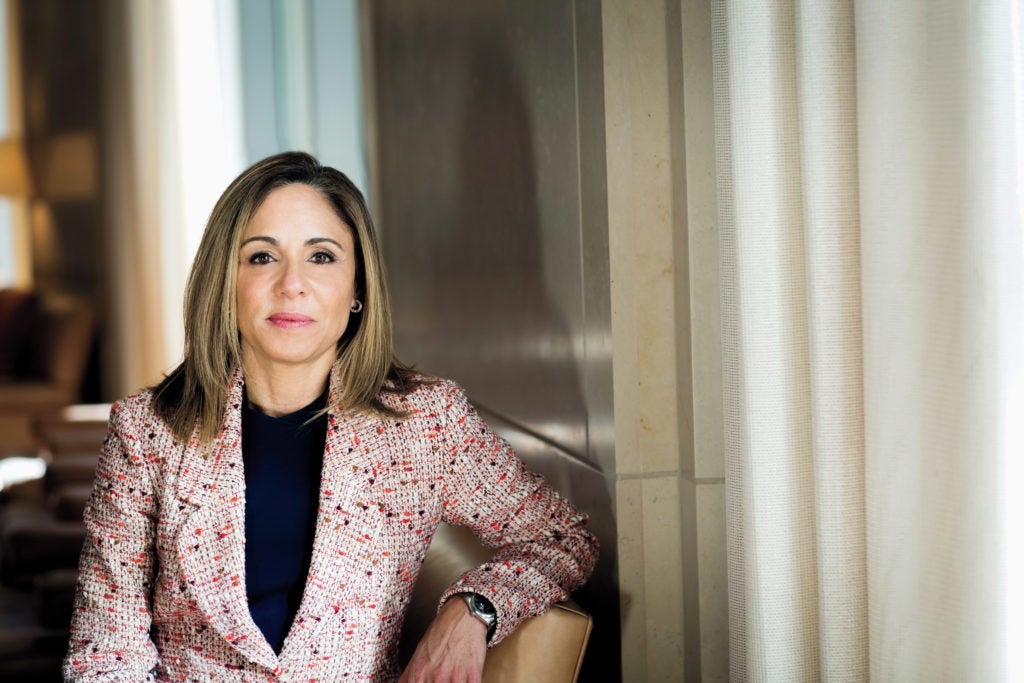
The chief legal officer and general counsel for HP Inc., Kim Rivera ’94 has advised Fortune 500 companies for more than 20 years. She often speaks on the topics of female leadership and diversity in corporations and the law. Raised in Paraguay and Puerto Rico, and orphaned at 15, she came to HLS after graduating from Duke University.
Early influences in her life:
The adult who helped me the most was my mother. My father died when I was just a baby. My mother died when I was 15. The most important thing she imparted to me was that it was vital that I get the absolute best education that I could, and that my final destination should be the United States.
Memories of HLS:
Harvard was the first place where I was genuinely exposed to people who were both incredibly smart and really diverse. It was unbelievably exciting and unbelievably intimidating. The early ’90s was a fairly contentious time at the law school—very fractured, very divided, very politicized, very aggressive. It had an air of combativeness to it the entire three years.
Advice that has shaped her career:
“A big moment in my career was when i stopped picking jobs and started picking people.”
—Kim Rivera
I credit that first general counsel who hired me with changing the way I thought about a corporate career. He said that with corporate careers, sure, you have to have substantive expertise. But being a general counsel, a house lawyer, is as much about your business acumen, how astute a manager and leader you are, how smart you are, how agile you are, and how fast you can learn and apply your practical judgment and your expertise to solving problems.
On resilience in corporate work:
In the corporate world, things move very fast. A lot of change happens. You have to be willing to take some level of risk. You have to be agile in how you think, make good decisions on a shortened horizon, and figure out how to outmaneuver and outperform other competitors and other people. You are going to make mistakes. If you don’t have resilience, if you can’t make a mistake, take it in stride, learn from it, apply that lesson, and keep moving forward, it’s very hard to have what I think of as a long and successful career.
How to build resilience:
You have to start with trying to be self-reflective. Know and understand yourself, what motivates you, and what might be driving you to feel certain ways. Try to keep a broad perspective. Setbacks and failures never feel good, but expect them to happen in the course of your career, and think of your career as a 30- or 40-year horizon. I always look for the lesson in something, even when it’s difficult or painful or upsetting or embarrassing. My mind is always searching for a way to extract some building block from it.
On focusing on people, not the job:
A big moment in my career was when I stopped picking jobs and started picking people. When I started looking at who my bosses would be, who my colleagues would be, what working with them would be like, what I would learn from them, how I would grow, it completely transformed my career choices and how I felt and thought about my work.
Her advice for women aspiring to leadership:
I tell young women all the time: Invest in the relationships you build, not just at work, but outside work. They always seem like extra effort, extra time, especially for those of us who have families and children. But every great opportunity I have had in my career came as a result of networking, discussions and relationship-building. It’s not a luxury. If you want to have a very long, successful career, you have to do a little of it all along the way.
